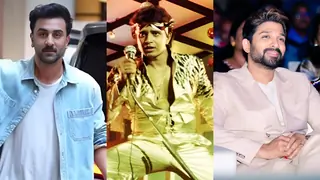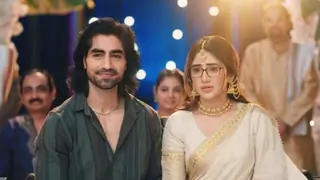"Kehte hain ke jab kissi ka janam hota hai, ussi raat, Bidhaata khud dharti pe aate hain, usska bhaagya likhne?" asked the small girlish voice. (They say that when someone is born, that night, the God himself comes on Earth to write his fate?)
"Yeh aapse kisne kaha?" smiled the older woman who was rubbing fragrant hibiscus oil on her scalp and in her long black tresses. (Who told you this?)
"Aabha ne! Ussko ek bhai mila hai na?" (Aabha did! She got a brother, right?)
The woman smiled. "Haan, aata hai. Iss liye raat ko bacche ke paalne ke paas dher saari mithaaiyan rakhte hain. Yeh bhi kaha jaata hai, ki agar uss bacche ka bhavishya achha hai, to subha ko ek bhi mithaayi nahin rehti!" (Yes, he comes. This is why they keep a lot of sweets in a baby's room. If his fate is good, all the sweets disappear the next morning.)
"Voh hiss liye ke raat ko naukar sab kuchh khaa jaate hain!" another child's voice commented, her voice dripping with sarcasm. (That's because servants eat them up at night!)
"Anji!" the first girl lightly tapped the hand of the one who was waiting for her turn, although it seemed like she was not looking forward to it. "Toh Madhu Ma?" the first one continued. "Humaare liye bhi aaye the? Bidhaataji?" (So, Madhu Ma? Did he come for us? The God?)
Madhumati sighed at looked at the two girls who were sitting on the floor, one between her knees, the other facing her. She smiled sadly. "Nahin, Khushi, voh nahin aaye the." (No, Khushi, he did not.)
"Kyunki voh hain hi nahin!" Anji said. (Because he does not exist!)
Khushi remained silent but she twisted her neck to look at her aunt. Her eyes were inquisitive. Madhu merely chuckled and turned her neck back to resume her task. Khushi was always full of questions. Even though she was just seven years old, she looked at everything intelligently and raised questions every now and then. There were times when no one would have a fitting answer to her. And Anjali, on the other hand, was a small ball of angry fire. She was always daring people with her witty replies. But she loved Khushi more than anything.
"Madhu Ma? Jab humaara janam hua tha, mithaaiyan gayab hogayin thi?" Khushi went on firing her questions. (Madhu Ma? When we were born, did the sweets disappear?)
Madhu sighed again. "Nahin, Khushi. Tum dono itni bhaagyashaali nahin thi."(No, Khushi. You two were not that lucky.)
"Par uss raat aapne kuchh nahin dekha?" (But that night, did you not see anything?)
"Na." (No.)
"Aapne kuchh to suna hoga?" (You must have heard something?)
The woman shook her head sorrily under Anjali's watchful gaze. "Shayad Bidhaataji ladkiyon ke liye nahin aate," she replied in her tired voice which meant that it was enough questioning. (Maybe He does not come for girls.)
But inside her head, Khushi knew why Bidhaataji had not come. She had heard it so many times from so many people, and yet, it pricked her heart when she thought of it. She did not really want to believe it.
It was because she and Anjali were unlucky enough to kill their respective fathers even before they were born.
Was that not the reason her own mother always looked at her with some sort of disdain? Was that not why her mother whispered 'Durbhaaga' under her breath if the first person she saw in the morning was her daughter?
Anjali and Khushi were orphans. Before their mothers had completed their nine months of pregnancy, their fathers had lost their lives because of the greed of an adventure which had lured them and the girls had been forever marked as unlucky.
But in another way, they had been lucky. Their fate had been like no other's. Yes, they had lost their fathers, who would have, surely, doted on them as any father would. But they also had been raised by three mothers. Who had such a fortune?
There was Madhumati, married at thirteen and widowed by fifteen. Her brother had taken her back when her in-laws had kicked her out mercilessly. She had no child. Afterall, she and her husband had been children themselves. Madhu was the one who took most care of the girls. She was in charge of their school uniform, their clothing, their food. She told them stories to lull them to sleep. She indulged them by cooking their favourite dishes.
There was Garima, Anjali's mother. She was not really beautiful with her wrinkle-creased face and the streaks of grey in her hair but her eyes, dark and unfathomable, held a lot of love and compassion gave her the aura of a queen. Garima took care of the girls' education. She helped them with their homework as soon as she got back home from the family library, her husband's legacy. Sometimes, she would bring them books to read or take them with her to the library during the holidays.
Then there was Manorama, Khushi's mother, whose skin was still as resplendent and unblemished as it had on the day she had married Khushi's father, because, despite her widowhood, she never failed to apply turmeric paste on her face every day. She was truly beautiful, without even one grey hair in her mane of long dark hair, her lips reddened by the paan she chewed after every meal. She often invited her friends home for tea and to gossip. She preached the girls about their behaviour but she rarely cared for them. Madhu and Garima were too kind to think of it, but Manorama was almost good for nothing.
When Madhu had finished rubbing the oil, she plaited Khushi and Anjali's hair neat and sent them downstairs where Rama - as they called Manorama - had again invited her friends. They ran together, hand in hand and erupted in the large living room, in front of the dozen of women who gossiped there. Garima usually kept away from such meetings; she stayed for a few minutes, then left to go pray in her room.
One of Rama's friends, Sunita cackled on seeing them together. "He Probhu!Tomra duu jone eek opor ke chara kicchu korte parro na naki? Hamesha aise saath chipke rehte ho, jaise judua!" (Oh God! Can't you two do anything without each other? You are always sticking together like twins!)
Anjali gave her a frightening scowl but Khushi smiled. "Aap jaanti nahin, Bua? Hum donon to judua hi hain!" (Don't you know aunt? We are twins!)
Sunita glowered at her girl while Rama narrowed her eyes.
"Ei ladki!" Sunita hissed. "Amake ferod uttor debar chestha korbe na. Tumi ki bhabcho amar theke beshi jano tumi? Behen to door ki baat hai, tera baap aur Anjali ka baap, voh dono bhi sage bhai nahin the." (Hey girl! How dare you answer back to me, little girl? Do you think you know better than me? Far from being sisters, even your fathers were not brothers.)
Anjali's small hands bunched into fists, ready to snap at the woman who was hurting her sister with harsh words but Khushi's calm demeanour stopped her.
"Tum dono to ek hi samay bhi payda nahin hui thi," Sunita continued triumphantly. "Hai na, Rama Di?" (The two of you were not even born at the same time, isn't it, Rama Di?)
Rama sighed dramatically. "Anjali ka janam din ke barha baje hua tha, aur Khushi ka raat ke barha baje. He Probhu! Hum to mar hi rahe the! Kitna khoon khoya tha humne. Dayi-ma to yeh bhi keh rahi thi ke haspataal jaana padega, aur sab jaante hain ke voh auraton ka payt kholkar bachhe ko nikaalta hain, aur ma mar jaati hai!" (Anjali was born in the middle of the day, and Khushi was born in the dead of the night. Oh God! I was dying! I had lost so much blood. The midwife was even saying that we should go to the hospital, and everyone know they cut open women's bellies to remove their babies and the mothers are left to die!)
"Par uski zaroorat nahin padi thi?" Khushi asked innocently. (But that was not needed?)
"Na..." (No...)
"Kyun ki Anjali ne aapko bacha liya, na?" (Because Anjali had saved you, right?)
Rama glared at her daughter in silence while Anjali's hand tightened around Khushi's. In her mind, Anjali recalled the story she had heard so many times from Madhu Ma. One morning, a jeep of policemen had arrived and told them the bodies of the two men had been found. The two wives, who had been heavily pregnant of slightly more than eight months, went into labour due to the shock.
Anjali's birth had been difficult but quicker. She had been born the next day, when Garima had lost hope of living, at midday sharp. Rama's suffering was not near to end. She lost double the amount of blood Garima had. She had stronger contractions. After the birthing, Garima had fainted exhaustion but as soon as she had recovered, she had asked about Rama and her baby. The midwife had sadly shook her head, explaining that it did not want to come to the world. Perhaps it knew already, that its father was dead...
Garima had left her bed with her newborn daughter and crossed the broad hallway to Rama's birthing chamber, though the midwife had warned her not to as she would lose more blood. She lay Anjali on Rama's huge belly, face down even as the baby screamed and cried. Soon, Rama's pain would increase and a few more minutes later, at midnight sharp, she gave life to another girl.
"Sabko kahani sunaaiye, Ma!" Khushi urged with her childish impatience. (Tell the story to everyone, Ma!)
Manorama huffed and lifted her chin, refusing to look at her daughter, with her false pride, but then she did narrate her 'misfortunes', as she called it. She and Sunita looked at Khushi mockingly and were about to change the subject.
"Issi liye, Bua," Khushi suddenly said beaming. "Issi liye, hum kehte hain ki Anjali humaari judua behen hai. Kyunki Anjali hi hai jisne humein duniya mein bulaaya tha." (That's why, aunt. That's why I say Anjali is my twin. Because she is the one who called me to this world.)


























703